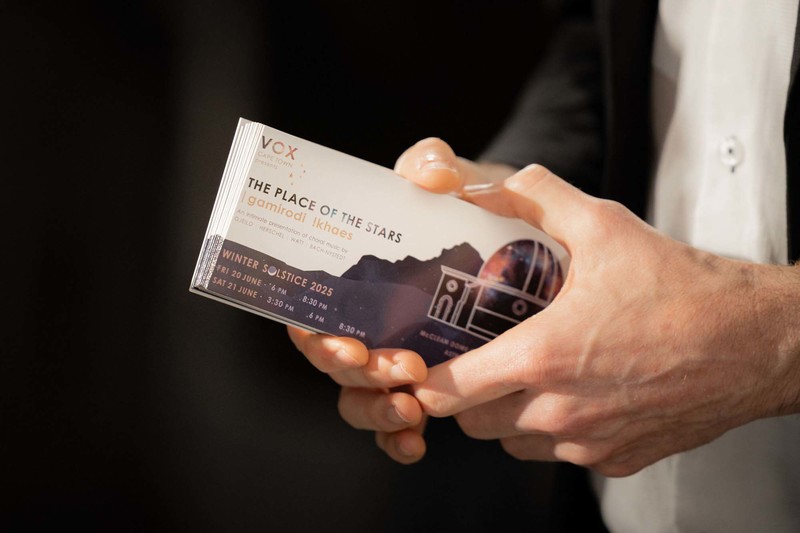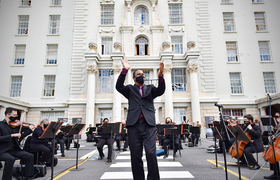Music and astronomy: a celebration of wonder, sound and space
23 July 2025 | Story Nicole Forrest. Photos Domenic Singh-Gorin. Read time 7 min.
VOX Cape Town is an innovative ensemble that was created to invigorate local choral music through imaginative programming and staging to create intimate, multisensory experiences. The choir recently celebrated its 10-year anniversary with a series of breathtaking performances at the South African Astronomical Observatory (SAAO).
As dissonant as the two might seem, there is an undeniable harmony between science and singing. The way that music, especially choral music, is performed has a profound effect on listeners; sound waves produced by singers’ voices can give us goosebumps, make us feel giddy or even move us to tears as they hit our ears.
This synergy is what Dr John Woodland, a research officer at the University of Cape Town’s (UCT’s) Holistic Drug Discovery and Development (H3D) Centre, has been nurturing over the past decade to create the unforgettable musical experiences presented by his ensemble, VOX Cape Town.
The group was founded in 2015 with a vision to create fresh, mesmerising choral experiences to enrich the musical life of the Mother City, bringing performances of lesser-known and new choral music to non-traditional performance spaces around Cape Town.
“We’ve performed in wine cellars, art galleries, a bakery and a brewery and, most recently, at the SAAO.”
“VOX likes to do things differently from other choirs. We take our music to unusual spaces, juxtaposing different styles in unconventional contexts. We’ve performed in wine cellars, art galleries, a bakery and a brewery and, most recently, at the SAAO,” said Dr Woodland.
VOX also has a close association with UCT; it presented a series of botanically inspired recitals at the Irma Stern Museum in 2019 and earlier this year participated at the UCT Summer School in the Baxter Concert Hall.
“We take a playful, experimental approach to our performances (not unlike a scientific investigation) to encourage our audience to think about and participate in the musical experience, especially with our intentionality towards programming and staging.”
The Place of the Stars
The spirit of musical exploration that VOX has become known for, found its most evocative expression in the group’s recent winter solstice performance series, |gamirodi !khaes or “The Place of the Stars”. The title of these recitals was inspired by the UCT Faculty of Health Sciences’ recognition of the sacred site on which it now stands in Observatory; and its significance to South Africa’s indigenous people.
Here, music and astronomy converged in a celebration of wonder, sound and space. Staged under the canopy of the McClean Dome at the SAAO, the programme invited audiences to reflect on the celestial and the human, tracing the invisible threads between harmony and the heavens.
“Performing at the observatory has been on my musical bucket list for a while – not only because of its scientific significance but also because the acoustics in the historical McClean Dome, designed by the famous architect Herbert Baker, are glorious for singing.
“The spaciousness and symmetry of the dome means that it has a generous, resonant acoustic for us to play with, to make the music come alive in a way that it wouldn’t in other performance spaces,” Woodland said.
Journeying through the cosmos
After being led through the observatory’s new visitors’ centre and listening to a short talk about the history of astronomy in the Cape, audiences at The Place of the Stars made their way to the McClean Dome for a performance of Norwegian composer Ola Gjeilo’s ethereal “The Spheres”.
The evening continued with William Herschel’s “Te Deum”, a work chosen not only because of the symbolic bridge made between the worlds of art and science by its composer (Herschel composed a significant amount of music and also discovered the planet Uranus in 1781), but also his links to the Mother City.
“Herschel’s son John was also an astronomer and scientist; he spent four years in Cape Town mapping the southern sky, working closely with Thomas Maclear (the Astronomer Royal in the Cape), and, together with his wife, illustrating our indigenous flora. During that time, John Herschel met Charles Darwin, and although Darwin was seemingly unimpressed by the Cape, their conversations did influence Darwin’s writings in his Origin of Species,” Woodland noted.
“In the end, I think we were able to craft a beautiful synthesis of science and the arts.”
The highlight of the evening came in the form of the world premiere of the “Missa Desolata”. The piece was written by the head of Composition at the South African College of Music, Associate Professor Martin Watt, in memory of the late Emeritus Professor Peter Klatzow who would have turned 80 this year.
“Peter was one of South Africa’s most important composers. He was a former director of the South African College of Music and was very interested in indigenous cosmologies. So, including Martin’s “Missa Desolata” in our programme was an important way to honour Peter’s legacy,” Woodland explained.
Crowning the recital was a performance of the haunting “Immortal Bach”, a piece reimagined by Knut Nystedt from a fragment of a Bach chorale. Sung at a pace chosen by each singer, the musical ‘smearing’ of this process evokes a sense of timelessness, “which gives the audience the same feeling of vastness, or even a glimpse of eternity, as when we look up at the night sky,” Woodland added.
In chorus for community
Of course, these unusual and inspiring events don’t come about by chance. There are weeks, months and years of planning and preparation that go into creating sublime choral experiences like “The Place of the Stars”.
“For this performance in particular, it took about two years for us to take it from concept to performance. That’s not to mention the hours that the singers themselves, and our creative manager Dr Kyle Paulssen [an anatomy lecturer in the UCT Department of Human Biology], dedicate to rehearsals to make the event so memorable,” Woodland said.
“In the end, I think we were able to craft a beautiful synthesis of science and the arts, linking the past with the present as well as the future, by curating this special musical experience for our community.”
VOX Cape Town is staging multiple performances throughout the remainder of 2025, including an appearance on Fine Music Radio (30 July from 19:00 to 21:00) and a Choral Pilgrimage in the City on the morning of St Cecilia’s Day (22 November). You can view the full schedule on the VOX Cape Town website.
 This work is licensed under a Creative Commons Attribution-NoDerivatives 4.0 International License.
This work is licensed under a Creative Commons Attribution-NoDerivatives 4.0 International License.
Please view the republishing articles page for more information.




















